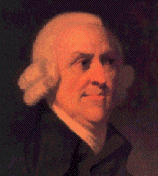June 5: Adam Smith
Adam Smith (1723)
It was on this date, June 5, 1723, that economist Adam Smith was born in Kirkcaldy, Scotland. Early in his education, while attending Glasgow and Oxford Universities, he adopted the philosophy of fellow Scot David Hume (1711-1776), who later became a good friend. He declined an obligation to enter the Scottish ministry, but instead at age 28 became a professor of logic, and later of moral philosophy, at Glasgow University, where he lectured on theology, ethics, jurisprudence and politics — while still living at home with his mother. He would remain there all his life, never marrying
But Smith's mind ventured far and wide: from history to philosophy, to jurisprudence, to the study of government, and, finally, to a study of political economy. Clerical Scotland was startled to read Smith's 1759 Theory of Moral Sentiments. This work was influenced by Hume's Treatise of Human Nature — indeed, when caught reading Hume's book at school, Smith was reprimanded and the book confiscated — and it espoused a naturalist, that is to say, a Deistic world view. The clerical reaction to this work persuaded Smith that further advocacy of the idea that morality comes not from God but from sympathy, would not help his career. But the general reception of the book enhanced his scholarly reputation.
After the Seven Years War ended, he traveled to France, where he met many skeptical "physiocrats," who were working out their own system of economics. Their ideas were the precursors to classical political economy and strongly influenced Smith. While abroad, Smith visited Voltaire at Geneva, who persuaded Smith to believe that, "Science is the great antidote to the poison of enthusiasm and superstition." And he began to work out his own ideas on political economy. In the same year that his friend David Hume died, 1776, Smith published the work that entitles him to be called "the father of British political economy": Inquiry Into the Nature and Causes of the Wealth of Nations. His philosophy gave the invisible hand of the market the upper hand in economic affairs, the less government interference the better, which is the philosophy of aggressive capitalists today.
When Hume died, Smith edited some of his non-controversial papers for publication — Hume had been a Rationalist who still professed a belief in God — and even wrote a sympathetic life of Hume, which Chalmers' General Biographical Dictionary describes as "a powerful blow against Christianity." The work caused such a stir among the clergy in Scotland, especially from the Bishop of Norwich, John Home (1722-1808), who practically accused Smith of Atheism:
Are you sure, and can you make us sure, that there really exist no such things as God, a future state of rewards and punishments? If so, all is well. Let us then, in our last hours, read Lucian, and play at whist, and droll upon Charon and his boat; let us die as foolish and insensible, as much like our brother philosophers the calves of the field and the asses of the desert, as we can, for the life of us. ... Upon the whole, doctor, your meaning is good; but I think you will not succeed this time. You would persuade us, by the example of David Hume, Esq., that atheism is the only cordial for low spirits, and the proper antidote against the fear of death.
Smith was trying to make a living as a public employee, so he remained silent about his religious beliefs. Shortly before he died, on 17 July 1790, he had sixteen volumes of his manuscripts burned, lest posterity look askance at his own career. It is generally accepted that Adam Smith was at most a Deist, but considering how close he was to Hume, he may in fact have been an Agnostic.
Originally published June 2003 by Ronald Bruce Meyer.


